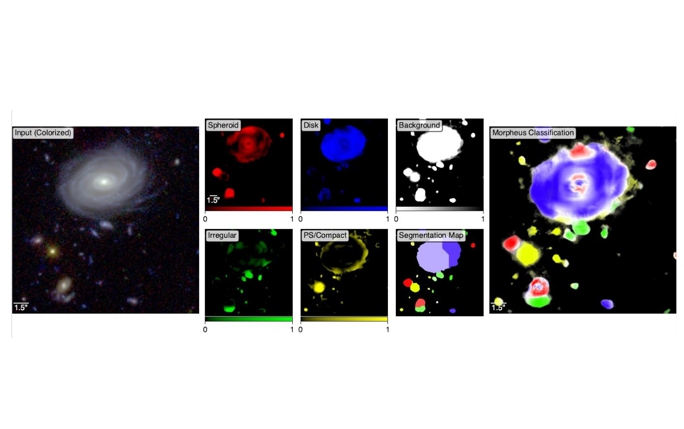Seminar – Morpheus: A Deep Learning Framework for the Pixel-level Analysis of Astronomical Image Data

In spring, LIV.DAT held a number of Virtual Seminars on Data Science for staff, students and anyone else who was interested. With the new academic year underway we are delighted to announce the next seminars in our LIV.DAT Virtual Seminar Autumn Series on Data Intensive Science. Seminars will cover R&D outside of our centre’s core research areas and give an insight into cutting edge research in this area.
The next upcoming seminar will be given by Professor Brant Robertson from the University of California (UCSC) who will talk about Morpheus, a newly developed model for generating pixel-level morphological classifications of astronomical sources. Professor Robertson and his research was a suggestion by one of the LIV.DAT supervisors and we are very honoured that he has accepted our invitation to present.
Astronomy is on the cusp of a data revolution, with facilities like the Vera Rubin Observatory (formerly LSST) and the Nancy Grace Roman Space Telescope (formerly WFIRST) posed to provide high-quality, multi band images over thousands of square degrees on the sky. With tens of billions of astronomical objects in these images, astronomers need to devise new methods to identify and classify stars and galaxies at scale. To address these challenges in astronomical data analysis, Prof Robertson and colleagues have developed Morpheus, a new model for generating pixel-level morphological classifications of astronomical sources. Morpheus leverages advances in deep learning to perform source detection, source segmentation, and morphological classification pixel-by-pixel via a semantic segmentation algorithm adopted from the field of computer vision. He will review the model and its performance, and shows applications to real astronomical data including the largest Hubble Space Telescope surveys taken to date.
Biography
Brant Robertson is a Professor in the Department of Astronomy and Astrophysics at the University of California, Santa Cruz. His research interests include theoretical topics related to galaxy formation, dark matter, hydrodynamics, machine learning, and numerical simulation methodologies. He was previously the John and Maureen Hendricks Visiting Professor at the Institute for Advanced Study, Princeton, NJ in 2019, and an Assistant Professor at the University of Arizona from 2011-2015. He held a Hubble Fellowship at the California Institute of Technology from 2009-2011. Professor Robertson earned his Ph.D. in Astronomy from Harvard University in 2006.
Participation is free, but you need to register to attend this and other webinars in the series.
For more information and how to register please follow this link
Upcoming Seminars
Professor Brant Robertson
Dept. of Astronomy and Astrophysics, University of California (UCSC)
Seminar Title: “Morpheus: A Deep Learning Framework for the Pixel-level Analysis of Astronomical Image Data”
Monday 19 October 2020 at 16:00 (Europe/London)
Professor Paul Watson
Computer Science and Director of the Digital Institute, Newcastle University
Seminar Title: “A Declarative Approach to Distributed Stream Processing”
Monday 9 November 2020 at 14:00 (Europe/London)
Dr Jana Kemnitz
Senior Data Scientist, Distributed-AI-Systems Research Group Siemens
Seminar Title: “Industrial DataScience, Machine-, Transfer- and Federated Learning”
Monday 7 December 2020 at 14:00 (Europe/London)